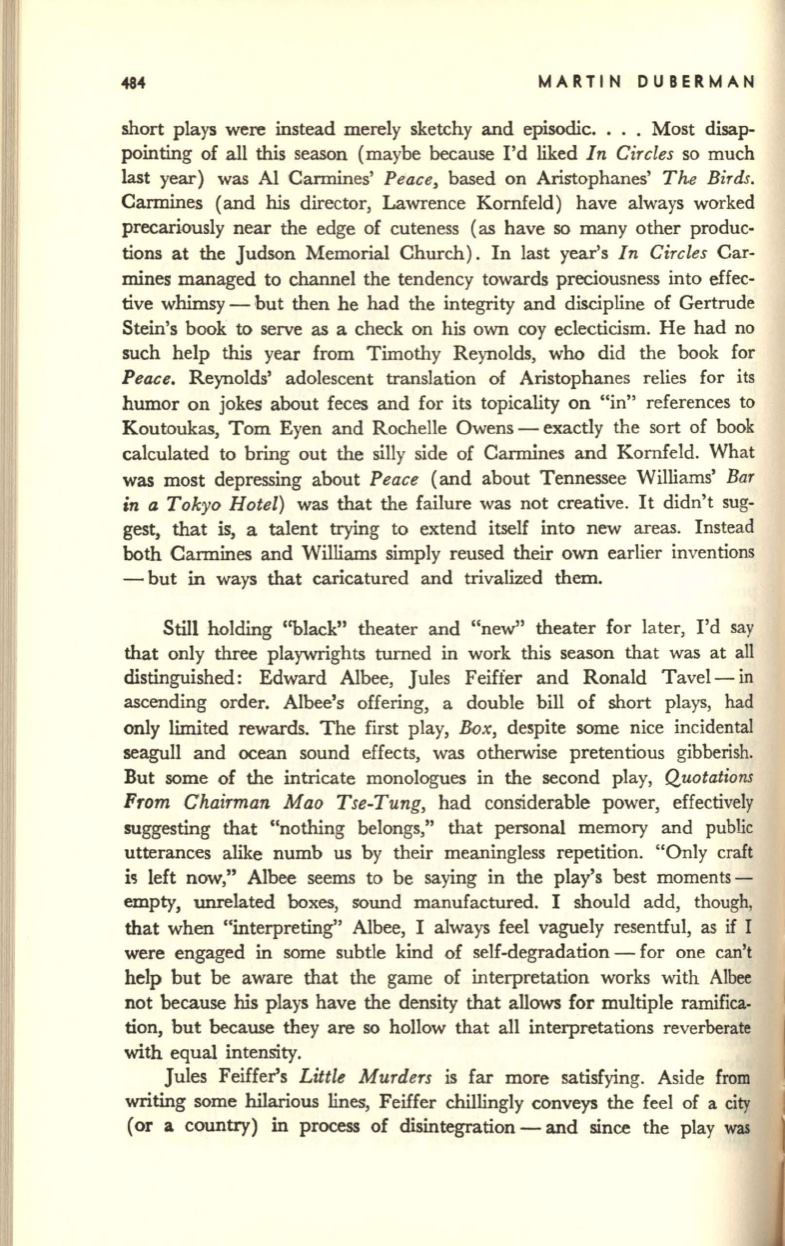
484
MARTIN DUBERMAN
short plays were instead merely sketchy and episodic.... Most disap–
pointing of all this season (maybe because I'd liked
In Circles
so much
last year) was Al Carmines'
Peace,
based on Aristophanes'
The Birds.
Carmines (and his director, Lawrence Kornfeld) have always worked
precariously near the edge of cuteness (as have so many other produc–
tions at the Judson Memorial Church). In last year's
In Circles
Car–
mines managed to channel the tendency towards preciousness into effec–
tive whimsy - but then he had the integrity and discipline of Gertrude
Stein's book to serve as a check on his own coy eclecticism. He had no
such help this year from Timothy Reynolds, who did the book for
Peace.
Reynolds' adolescent translation of Aristophanes relies for its
humor on jokes about feces and for its topicality on "in" references to
Koutoukas, Tom Eyen and Rochelle Owens - exactly the sort of book
calculated to bring out the silly side of Carmines and Kornfeld. What
was most depressing about
Peace
(and about Tennessee Williams'
Bar
in a Tokyo Hotel)
was that the failure was not creative. It didn't sug–
gest, that is, a talent trying to extend itself into new areas. Instead
both Carmines and Williams simply reused their own earlier inventions
- but
in
ways that caricatured and trivalized them.
Still holding "black" theater and "new" theater for later, I'd say
that only three playwrights turned in work this season that was at all
distinguished: Edward Albee, Jules Feiffer and Ronald Tavel- in
ascending order. Albee's offering, a double bill of short plays, had
only limited rewards. The first play,
&lx,
despite some nice incidental
seagull and ocean sound effects, was otherwise pretentious gibberish.
But some of the intricate monologues in the second play,
Quotations
From Chairman Mao Tse-Tung,
had considerable power, effectively
suggesting that "nothing belongs," that personal memory and public
utterances alike numb us by their meaningless repetition. "Only craft
i'J left now," Albee seems to be saying in the play's best moments–
empty, unrelated boxes, sound manufactured. I should add, though,
that when "interpreting" Albee, I always feel vaguely resentful, as if I
were engaged in some subtle kind of self-degradation - for one can't
help but be aware that the game of interpretation works with Albee
not because his plays have the density that allows for multiple ramifica–
tion, but because they are so hollow that all interpretations reverberate
with equal intensity.
Jules Feiffer's
Little Murders
is far more satisfying. Aside from
writing some hilarious lines, Feiffer chillingly conveys the feel of a
city
(or a country) in process of disintegration - and since the play
was


